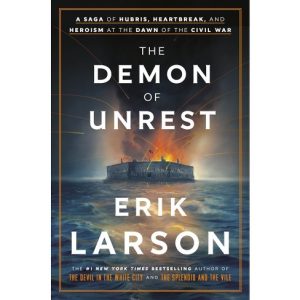★★★★★
Erik Larson is one of our country’s best writers in any genre and one of the few popular historians I regularly re-read.
Whether writing about a historic hurricane in early 19oo’s Galveston or Nazi Berlin in the 1930s, his books are thrilling, evocative, beautifully written, and totally immersive. His level of detail is never excessive but always well-balanced. Every book is a fantastic voyage and his subjects are chosen, he says, for their suspense and a clear beginning, middle, and end. They’re true page turners and you often feel you’ve been transported into the scenes he is sharing.
Larson’s story of the siege of Fort Sumter and the dithering in Washington D.C. about its fate as secession spread through the South is an amazing tale of courage, cowardice, treachery, stupidity, loyalty, lies and propaganda–in sum, a sadly American story.
Relying on contemporary letters, diaries, government reports, speeches, and newspaper stories and editorials, Larson makes you feel like you are in the midst of the rising turmoil in which both sides seem to overestimate their own chances for success. You come to know President-elect Lincoln and women like the indefatigable diarist Mary Chestnut in new and illuminating ways. They’re surrounded by myriad schemers, wastrels, fools, incompetents, liars, traitors and cowards–with rare men or women of sense making an appearance anywhere.
And the thread all the way through is the Southern culture of honor and shame. Because so many Northerners believed that slavery was evil and shameful, Southern planters and their kith and kin were humiliated by those feelings, terrified of losing the lifestyle and economy that would collapse without slave labor. The hysteria in places like Charleston was a heavy miasma, likewise the savage hatred of Yankees.
Larson’s explanation of the weaponry aimed at Fort Sumter and the fortress itself is anything but dry. You will feel yourself in the thick of the battle. Even more fascinating is his portrait of paranoid, cloistered, provincial South Carolina’s elite who thought of themselves as “the chivalry.” They believed in fighting duels and quoting poems and novels by Sir Walter Scott as if they were living in another time. And they were: the rest of the country was expanding railroads and telegraph service while they resisted because such changes could supposedly lead to unrest: slave rebellions.
The book is filled with shocking details like a 9:00 curfew bell ringing in Charleston to make sure that all Black men and women, whether free or slaves, got off the streets and went to their homes wherever they might be. Chivalry, of course, only covered rich white people who lived a life of endless, mindless calling upon another, teas and dinners and horse racing–and politics. The up side of this was the attack on Fort Sumter which is the main story line: southerners actually at times cheered the bravery of the fort’s commander and his men.
It’s impossible to read this thrilling book that describes such myopic, arrogant, and bigoted participants in the national drama and not think about today’s current cultural and political madness.
Lev Raphael has reviewed books for The Washington Post, The Detroit Free Press and three different public radio stations in Michigan.

